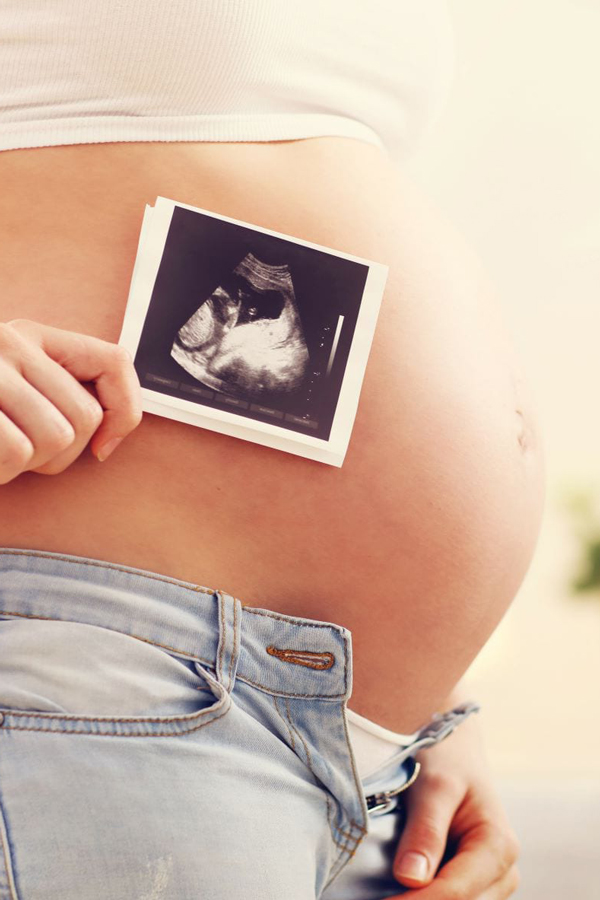
Pregnancy is a time of waiting, often accompanied by anxiety about the child’s health. It is obvious that every parent wants the pregnancy to go smoothly and the baby to develop healthily. Prenatal tests give us the opportunity to assess foetal development and detect genetic and developmental defects at an early stage. Quick detection of developmental abnormalities in the child or in the course of pregnancy allows for possible treatment before or immediately after birth.
There are various prenatal tests. The simplest division distinguishes non-invasive and invasive tests. Non-invasive tests include ultrasound scans, when the doctor can watch how the baby is developing in the mother’s body. PAPP-A and the Triple Screen, which rely on the analysis of a sample of maternal blood, are also non-invasive.
Currently, it is also possible to perform genetic tests on maternal blood. Prenatal genetic tests include NIFTY and HARMONY, which detect chromosomal trisomy and genetic disorders in the foetus.
Non-invasive prenatal tests include, among others, ultrasound. It is recommended to perform 3 prenatal scans over 3 consecutive trimesters of pregnancy: between 11 and 14 weeks of pregnancy, between 18 and 20 weeks of pregnancy, and between 28 and 32 weeks of pregnancy. It is important to comply with the scheduled dates in order for the results to be reliable.
In addition to providing abundant data about the child’s development and the course of pregnancy, ultrasound can be extremely exciting for parents as it gives them an opportunity to actually see their baby and listen to his or her heartbeat.
US performed between 11 and 14 weeks of pregnancy gives us much information about the developing foetus. This is the most important prenatal examination. During the first prenatal ultrasound, the doctor assesses many foetal parameters and features as well as the chorion and the uterus itself. The following assessments are performed during this ultrasound scan:
US scan performed between 18 and 22 weeks of pregnancy allows for the assessment of the foetal anatomy and the diagnosis of potential structural defects in the foetus, such as defects of the heart and central nervous system, cleft palate or vertebral column. In the case of doubtful foetal heart findings, it is possible to perform an echo of the foetal heart in order to accurately assess cardiac structure, detect heart or valve defects, and arrhythmias.
During the examination, measurements of the length of individual parts of the child’s body are also taken, on the basis of which we assess whether the foetal growth is correct. In the second prenatal examination, the placental function (abdominal and placental attachment of the umbilical cord and the number of vessels in the umbilical cord) and the amount of amniotic fluid are assessed.
US scan performed between 28 and 32 weeks of pregnancy assesses the final stage of foetal development. This examination is important due to the late manifestation of congenital defects, e.g. cerebellar hypoplasia, microcephaly, urinary and gastrointestinal defects, dynamic heart defects, limb defects.
The doctor checks whether the foetus is growing at the right pace and whether the placental nutritional functions are maintained.
PAPP-A – performed between 11 and 14 weeks of pregnancy. It is used to assess the risk of genetic chromosomal defects (Patau’s Syndrome, Edwards’ Syndrome, Down’s Syndrome). This test is recommended for all pregnant women. It consists in the simultaneous ultrasound measurement of nuchal translucency and the assessment of serum protein A and beta-HCG. The obtained results are analysed in reference to maternal age, gestational age and relevant perinatal history.
The Double Screen – is performed twice, at 11 and between 13 and 19 weeks of pregnancy to measure PAPP-A and beta-HCG.
The Triple Screen – is performed between between 15 and 20 weeks of pregnancy to measure beta-HCG, free oestriol and alpha-fetoprotein. It allows for estimating the risk of genetic defects, similarly to the PAPP-A test, and to assess the risk of congenital defects, such as spinal or umbilical hernia in the child.
Integrated screening – a very accurate test with sensitivity of more than 90%. It is a combination of 1st and 2nd trimester screening tests, i.e., ultrasound assessment of the nuchal translucency and the presence of the nasal bone, along with the measurement of PAPP-A and beta-HCG levels in the first trimester of pregnancy, and the triple screen in the second trimester of pregnancy.
NIFTY (Non-Invasive Foetal Trisomy Test). This is a non-invasive genetic test performed on maternal blood; therefore, it is completely safe for the baby. Extracellular foetal DNA (cffDNA) is isolated from the mother’s blood. The isolated child’s DNA is multiplied and analysed by sequencing. In addition to detecting Down’s, Edwards’ and Patau’s syndromes, it allows to assess other genetic defects and sex chromosome aneuploidy. This test is characterised by high sensitivity. Additionally, NIFTY enables determination of the child’s sex.
leave your email or phone number we will call you back
Fertilita © 2022. Wszelkie prawa zastrzeżone.
Projekt: kreatywnepiksele.pl